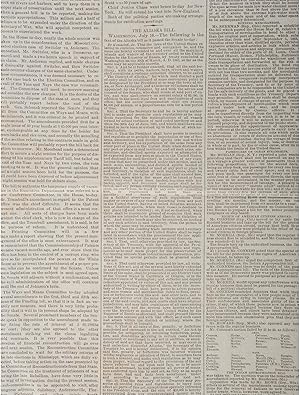Beschreibung
Newspaper. New-York Tribune, July 17, 1868. Featuring the terms of the Aliaska Bill as passed by the Senate. Copy belonging to President Andrew Johnson. New York: Horace Greeley. 8 pp., 18 x 23 3/4 in. This copy is stamped "THE PRESIDENT" at the top of the front page, indicating it belonged to President Andrew Johnson. The President would have read this copy of the act before Congress submitted it to him with some amendments on July 25. The report uses the early variant spelling of "Aliaska" for the territory and peninsula. Excerpts:"Be it enacted, &c. That the laws of the United States relating to customs, commerce and navigation be, and the same are hereby extended to and over all the mainland, islands and waters of the territory ceded to the United States by the Emperor of Russia." (p1/c2)"And be it further enacted, that all the said territory, with its ports, harbors, bays, rivers and waters, shall constitute a customs collection district, to be called 'The District of Aliaska,' for which said district a port of entry shall be established at some convenient point to be designated by the President at or near the town of Sitka, or New-Archangel, and a Collector of Customs shall be appointed by the President, by and with the advice and consent of the Senate, who shall reside at said port of entry, and who shall receive an annual salary of $2,500." (p1/c2)"That the President shall have the power to restrict and regulate or to prohibit the importation or use of firearms, ammunition, and distilled spirits into and within said territory." (p1/c2)"That, until otherwise provided by law, the Secretary of the Treasury, with the approval of the President, shall have power to prescribe such rules and regulations as he may deem proper for the preservation of fur-bearing animals from indiscriminate destruction, provided that no special permits shall be granted under this act." (p1/c2)Historical BackgroundAfter suffering defeat at the hands of the British and the French in the Crimean War of 1853-1856, Russia feared losing the Alaskan territory in some future conflict. In an effort to protect Russian interests, Tsar Alexander II (1818-1881) determined to sell Alaska. After offering it in 1859 to the United Kingdom, Russia negotiated a sale to the United States, finalized in 1867. At the time, the territory primarily offered fur trading and some natural resources. Americans generally supported the purchase and believed it enhanced American interests in the Pacific, though some critics labeled it "Seward's Folly," after Secretary of State William H. Seward, who had negotiated the purchase for the United States. Most newspaper editors, especially those in California, were enthusiastic about the purchase. Notable among the critics was Horace Greeley, the editor of this newspaper and a long-time opponent of Seward. The value of the new territory increased dramatically with the discovery of gold fields in 1896.The Senate ratified the Treaty with Russia on April 9, 1867, by a vote of 37 to 2. On July 14, 1868, the House of Representatives passed a resolution appropriating the $7.2 million necessary to purchase Alaska (less than two cents per acre), and the Senate approved the resolution with amendments. The House refused the amendments, and the resolution went to a committee. The House passed the resolution as revised by the conference committee on July 23, and the Senate passed it the following day.Meanwhile, on July 15, Senator Zachariah Chandler of Michigan introduced "An Act to extend the Laws of the United States relating to the Customs, Commerce, and Navigation over the Territory ceded to the United States by Russia, to establish a Collection District therein, and for other Purposes," and the Senate passed it on July 16. In the House, Representative Elihu B. Washburne of Illinois proposed amendments on July 25, and the House agreed to them. The Senate disagreed with the amendments, and this bi. (See website for full description). Bestandsnummer des Verkäufers 25042
Verkäufer kontaktieren
Diesen Artikel melden
![]()
